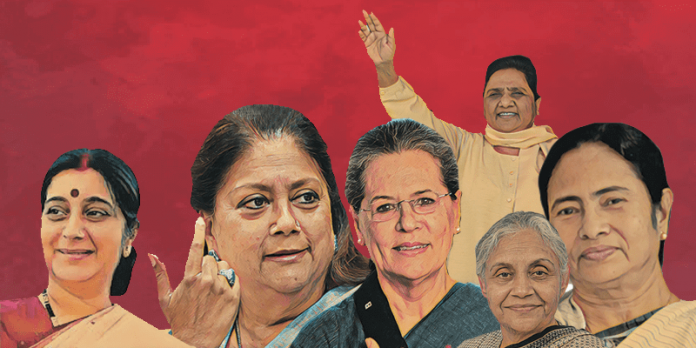This article has been written by Arpita Tripathy, from KIIT School of Law. This is an exhaustive article which deals with women and politics- a much-needed change.
Table of Contents
Introduction
In ancient times, the status of a woman and a man was at par. However, with changing times, the status of women deteriorated day by day. India is now a predominantly patriarch nation, where inequalities between men and women are evident. In the wake of the Independence struggle, Mahatma Gandhi promoted women to be involved in the fight against the British Empire. Mahatma Gandhi’s initiative directed and encouraged more and more participation of women in the decision making of the country.
Constitutional right of women
Mahatma Gandhi ensured that women played a significant role during the independence struggle. This brought about the concept of women in the decision-making process for the country. The women in India also demanded equal voting power in 1917 much before other countries started demanding it. The constituent assembly also incorporated equality in the Constitution. Article 15 of the Constitution of India also prohibits any discrimination based on sex. The Constitution also provides for equal right to vote to women.
The State also considers it as its duty to protect divorced and widowed women. However, even after the constitutional guarantee and participation of women in the Independence struggle, it is still seen that women in politics are far off from equal representation concerning men.
Political participation of women in India
After Joe Biden was declared as the winner of the 2020 Presidential election in the United States of America, the next focus was on Kamala Harris. Kamala Harris has been elected as the first female to act as the Vice President of the States. This Historic win of Kamala Haris is a landmark event that will not only act as a role model for America but also for women around the world. Before the election began, six women from different cultures and backgrounds had also announced their candidacy for President. It was a major achievement for the US because it has a very low rank in women’s participation in politics, therefore, this can act as a headstart for the country.
World’s youngest Prime Minister, Sanna Mirella Marin was appointed as the Prime Minister of Finland in December 2019. Sanna Marin challenged sexism in decision-making power for the country which has been dominated by men for years.
In the wake of the coronavirus pandemic, the Prime Minister of New Zealand, Jacinda Kate Laurel Ardern received appreciation from all over the world for making incredible progress in the country by controlling the coronavirus pandemic there. The world has been witnessing strong women leaders. Even India has seen women holding positions of authority. However, the ratio of representation is still very low.
India stands at 153rd rank out of 190 countries in the percentage of women in the lower house of a world parliament. In the 17th Lok Sabha elections of 2019, the turnout was 67% which has been improving for the past many years. The number of women voting has also increased in the election. In the 17th Lok Sabha election, we witnessed 78 women Parliamentarians. However, the percentage of representation of women is 14% in a country where women constitute 48% of the population. Out of the 29 States, 7 States did not have any women representation. Even Pakistan and Bangladesh have more female representation than India.
Factors affecting the participation of women in Indian politics
Traditionally, women’s participation in politics has been low key. They remain as loyal voters, supporters, or wives of politicians. However, their active participation in the decision-making process is still in the background and they rarely possess a position of authority. Only a few women from rich families or having a strong political background came forward and took part in politics. The women have not been able to come forth because of multiple factors. Some of them are:
-
Stereotypical minds
Politics has unfortunately always been considered as ‘dirty’ and is full of unhealthy competition. It has been considered as a domain suitable for men. It is believed that the field requires hardship, strength. Politics has been portrayed and is usually perceived as a game of greed. Further, the stereotypical mindset of the society that men make rules and women being submissive are bound to follow them. The gender role associated with men and women has been one of the major reasons behind less participation of women. The role of managing household activities has been traditionally assigned to women. Women should be encouraged to move outside their stereotypical roles and participate in the decision-making process of the country.
-
Lack of political participation
Women also do not participate in political debates and discussions. It has been seen that women lack interest in the field of politics and do not want to enter the ‘dirty game.’
-
Economic conditions
The political participation of people is also determined by the economic condition of their families. There has to exist an appropriate knowledge and sociological environment for political motivation. The cultural, economic, and sociological background of a person greatly affects political participation.
Women are confined to their homes and the major decisions of her life are taken by their father, brother, or husband.
-
Household chores
During voting, women are reluctant to go out and vote because of their household chores. Being a part of a political party would mean dedication towards it, however, a woman after her work will have to come back and continue with the household chores. This makes it difficult on the part of women to work for such long hours.
-
Lack of financial control
Women also lack financial support and financial control is not in their hand and therefore, it is difficult for them to stand in elections. Even if she earns and brings money home, even then the money is controlled by the male members of the family. Thus she lacks control over her own money.
-
Lack of political knowledge
Some women do not understand and know the importance of political participation. Many are not even interested in having a voting Id card. They do not have sufficient knowledge of how politics work, how political institutions work.
-
Increase in violence in politics
There has been increasing violence in politics. A significant rise of criminalization, corruption, insecurity has driven women out of the political arena. Women’s hard work is often not recognized by the dominant men in political parties. The perception that the leader should be masculine has undermined the hard work that women do.
-
Lack of safety
Lack of outside their household boundaries has been a major factor to stay away from politics. A woman has to overcome many hindrances to make their presence felt in Indian politics.
Prominent women in Indian politics
Even after many hindrances and obstacles, women have still made a prominent mark in Indian Politics. People from all over the country have admired their skills and leadership quality. The misconception that leadership should be in the hands of a male has been challenged by these women. These women are the personification of the struggle against sexism. When women are provided with adequate facilities they can do wonders. For young girls and generations to come, these ladies will be a role model for them in achieving and making a mark in a field that has been dominated by men. By observing women succeed in the political field provides a sense of strength and confidence among women. When a woman wins the election in a particular constituency, then the next time people will be comfortable in voting for women again.
- The first and the only female to be elected as the Prime Minister of the country, Indira Priyadarshini Gandhi is an inspiration for women in India. She served three consecutive terms (1966-77) as the Prime Minister of the country. She also served as the Prime Minister from 1980-1984, after which she was assassinated. She has some major accomplishments to her name which shaped the nation.
Wars are usually considered as a domain for men. But Indira Gandhi led India’s victory in the Indo- Pakistani war for the liberation of Bangladesh. One of her major achievements was to make India self-sufficient in food grains, popularly known as Green Revolution. She also took major decisions that changed the banking system of the country. Bank nationalization was also her accomplishment whose benefits can still be seen.
- The first and until now the only female President of India, Pratibha Patil was not only a politician but was also a lawyer. She served as a President from 2007 to 2012. Before being appointed as President, she had also held the office of Governor of Rajasthan. She had previously held the office of public health and social welfare. She had also been a member of the Rajya Sabha and Lok Sabha.
- Sonia Gandhi the former President of the Indian National Congress is an example of Indian women doing exceedingly well in Indian politics. Sonia Gandhi came to India after marrying Rajiv Gandhi. After Rajiv Gandhi’s death, she was looked upon as a natural heir to Rajiv Gandhi’s dynasty. She initially refused but later, she travelled all over the country to gain confidence and trust among people. In 2006 congress failed and therefore it made an alliance and UPA was formed. Sonia Gandhi led it. Gandhi did not agree to become the Prime Minister of the country because of her Italian nationality.
- Mamta Banerjee is also a prominent female politician who is the founder of the All India Trinamool Congress. She is the current Chief Minister of West Bengal. She has served twice as the Minister of Railways, has acted as HRD minister, youth affairs, sports minister, women and child development, and Minister of Coal.
- Sushma Swaraj, a Supreme Court lawyer is also a prominent Indian Politician. She was the youngest cabinet minister of Haryana. She has also served as the Chief Minister of Delhi. She has been elected as a member of Parliament 7 times.
Need for women in politics
Women comprise 49% of the whole population, therefore, it is very important to have proper representation of women in the Parliament. Women in Parliament will bring up the issues faced by women and might effectively understand and can formulate better laws. The opinion of women should be equally respected as men. For a vibrant democracy, it is important to have diversity in the Parliament so that new opinions come by so that every sector of the society can have a say in the decision-making process. A fair representation of women will develop the country economically and socially.
The stereotypical mindset of people that men can only be leaders and women need to be submissive and follow the rules has to be done away with. Having more women in Parliament will have a role model effect on people and people will have more faith in the decision-making power of women. Young girls will be encouraged to do better and will also come out to understand and know politics.
Women Reservation Bill
In counties where there is an appropriate representation of women, it can be seen that one factor which is common in all the countries is that of ‘reservation for women’. In Bolivia’s electoral law, it was mandatory to have 50% of women on the political party’s list. Similar laws have been formulated in many other different countries of the world.
In 1996, the women’s reservation bill was introduced in the Lok Sabha. The agenda of this bill was to reserve 33% seats in the Lok Sabha and State Legislature for women. The Vajpayee pushed hard for this bill to be passed but unfortunately, this bill was not passed. In 2008 the UPA Government again introduced this bill and it passed in Lok Sabha but did not pass in Rajya Sabha.
The reservation bill for women if passed and if implemented wisely, then it would affect our democracy tremendously. Women would have a say in the decision-making process which will help our vibrant democracy grow.
Conclusion
Hence, democracy needs people from every sector so that they can be adequately represented. India has seen a lot of crimes against women and there are ‘women issues’ which can only be adequately understood from a woman’s standpoint. The misogynist mindset has to be done away with by not keeping women confined within the walls of gender-specific roles stereotypes. We have witnessed women in Indian Politics who have shown excellence in leadership and have led the country towards success. Efforts should be made to educate and enlighten young girls about politics. Reservation would be an important milestone in achieving the desired goal.
References
- https://blog.ipleaders.in/need-for-women-leadership-in-indian-politics/
- https://www.news18.com/news/india/17th-lok-sabha-will-have-a-record-78-women-parliamentarians-but-equal-representation-is-still-far-from-reality-2159337.html
- https://www.orfonline.org/expert-speak/covid19-gendered-impact/#:~:text=Women % 20 constitute%2049%25%20of%20the%20Indian%20population%2C%20b ut% 20t h eir%20contribution,the%20global%20average%20of%2016%25
LawSikho has created a telegram group for exchanging legal knowledge, referrals and various opportunities. You can click on this link and join:
 Serato DJ Crack 2025Serato DJ PRO Crack
Serato DJ Crack 2025Serato DJ PRO Crack











 Allow notifications
Allow notifications


